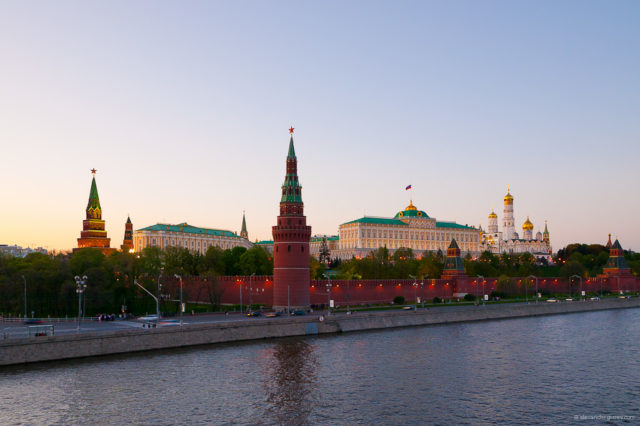
Hyper-Centralization of Russia Threatens Its Development and Survival
Publication: Eurasia Daily Monitor Volume: 14 Issue: 133
By:

Vladimir Putin’s centralization of power in Moscow over the last 18 years reflects his belief, and that of many others’, that the disintegration of the Union of Soviet Socialist Republics (USSR)—which he has termed “the largest geopolitical catastrophe of the [20th] century” (Kremlin.ru, April 25, 2005)—occurred because the union republics had gained too much power and acquired too many opportunities to pursue an independent course. But now, some Russian critics are saying that the result of concentrating almost all power and authority in Moscow, in and of itself, constitutes a threat to the territorial integrity of the Russian Federation.
The “Moscow problem” is discussed most often in terms of relocating the capital or some of its functions beyond the ring road. Calls for that as a means to reduce the hyper-centralization of Putin’s Russia are now commonplace, historian Yury Chernyshev pointed out, in an interview with Regnum, although he suggested he is skeptical such proposals will lead to anything, at least in the near term (Regnum, August 21). Still, he argued that something is going to have to be done because, today, “all Russia is divided between Moscow and not-Moscow,” rendering federalism meaningless and preventing the development of the country.
At the same time, there is a real problem that lies behind such talk, the historian said. “All Russia now is divided between Moscow and not-Moscow,” the result of Kremlin actions that have made federalism meaningless and that have sucked the best and the brightest out of the regions to the center, while allowing them to give orders and demand reports from the subjects. And that, in turn, has led to an even greater bureaucratization of the state apparatus than was the case in Soviet times. This trend has undercut any chance for the country to develop or even survive.
Others, like Moscow economist Vladislav Inozemtsev, suggest the problem is not Moscow as such, but rather hyper-centralization. In an article for Snob.ru, he urges for other cities and regions to be made more attractive as places of development. Moreover, he recommends that the country move to genuine federalism in which the regions come together to form the state, rather than having everything imposed top down. The latter approach to governing restricts development and breeds resentment every bit as much as Soviet policies did, Inozemtsev asserts (Snob.ru, August 21).
How can Russia create conditions in which there are dozens of such cities that “could become “ ‘anchors’ for people who do not want to live in villages” and who would be quite content to live in a mid-sized city if it had all the features of modern life and a modicum of financial and political power? Such a situation, of course, could arise “only under conditions of financial and political decentralization, the improvement of living standards in the regions, and the weakening of the attractiveness not of Moscow as the capital but of the capital as such, wherever it might be located.” That will require “a rejection of vozhdizm,” the tsarist “tradition” of Russian governance whereby one person takes on the role of an undisputed ruler. According to Inozemtsev, the Russian government will have to allow regions to make demands of Moscow, rather than only the other way around. Physically moving the capital without also implementing those changes would be meaningless, he concludes (Snob.ru, August 21).
A third commentator, Igor Eidman, who prepares Russian commentaries for Deutsche Welle, goes to the heart of the matter: He argues that “the de-Muscovization of Russia” is first and foremost about the destruction of “the corrupt bureaucratic vertical and the transfer of power to the localities and their peoples.” Only if that happens, he suggests, can any Russian government expect to “win the sympathy of the majority of Russian regions” (Kasparov.ru, February 4).
Because Russian law makes it a crime even to discuss the possibility of Russia’s coming apart (see Commentaries, April 4), most Russians involved in this discussion dance around the issue of how hyper-centralization could trigger the demise of the Russian Federation. But their comments—like the three just cited—show that is precisely what they are worried about. Indeed, Russian observers thinking about this possibility have identified five reasons why hyper-centralization is as much a threat to Russia’s territorial integrity as the existence of union republics was to the USSR a generation ago.
First, they clearly see that Moscow is not able to control everything across the enormous land that is the Russian Federation. Second, they recognize that Moscow’s attempt to impose a common policy on diverse places will have diverse outcomes and make governance even more difficult while generating popular anger. Third, they believe that without cooperation and feedback, Moscow will continue to make the kinds of mistakes that are outraging many non-Russian republics and even many Russian regions. Fourth, they believe that the bureaucratic dirigisme Moscow has created for itself leaves Russia without the ability to attract investment, develop economically and, most significantly, respond to unexpected challenges. And fifth—and this is a point that all of the participants in this discussion agree on—Moscow’s concentration of power has made Moscow the enemy, not only providing a focus for dissent but also the basis for alliances among the regions of the country.
Obviously, these factors do not necessarily point to the imminent disintegration of the Russian Federation. The existence of the union republics by itself did not lead to the end of the USSR, and there are many things the center can do to block or reverse any centrifugal trends. But one thing is certain: hyper-centralization and its dangers are likely to become an even more fundamental part of Russian politics in the future than they have been up to now. And if the center tries to ignore these challenges or to respond only by force, it may find itself in a position where anything it does only exacerbates its problems rather than solves them.



